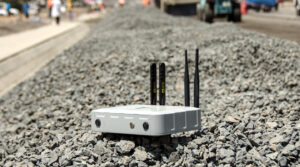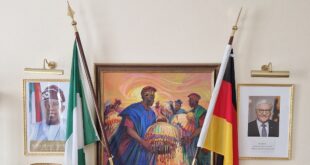This year’s prestigious German Africa Prize has been awarded to Juliana Rotich, an information technology expert. The Kenyan was honoured at a ceremony attended by German Chancellor Angela Merkel last week in Berlin. Here’s what you should know about the innovator and social entrepreneur:
Federal Chancellor Angela Merkel presented the 2019 German Africa Prize to the Kenyan Juliana Rotich last Wednesday (23 October) for her outstanding social and entrepreneurial engagement in the field of digital revolution in Africa.
At a festive ceremony in Berlin, attended by more than 300 guests from the worlds of politics, diplomacy, business and culture, the chancellor praised the awardee for her “outstanding socio-political flair and entrepreneurial skills.”

Juliana Rotich is a role model for women who, with their ideas, promote the economic and social development and not only of the African continent, she said.
“Their success encourages many other women. They show what and how much you can move with good ideas and determination – economically, socially, and beyond your own country’s borders. We need people like you, who have the courage for something new and with it also inspires others,” the chancellor said in her speech.
As co-founder of the open source software platform Ushahidi, on which users can upload events such as human rights violations, incidents of corruption or election fraud by SMS or e-mail in real time and geographically localized on an online map, Juliana Rotich has succeeded in creating a unique blend of social activism, citizen journalism and geo information, the Africa Foundation said in the laudation.
Ushahidi, the Swahili word for “testimony”, was first put to use during the Kenyan presidential election crisis of 2007-8; it has since been deployed in Chile, Japan, New Zealand, Australia, Pakistan, Tanzania and Haiti.
Meanwhile, Ushahidi is being used in over 160 countries for crisis response, election observation and to demand transparency and public accountability, benefiting millions of people around the world.

At the communications hardware company BRCK, which Rotich co-founded, she was instrumental to the development of a waterproof, solar-powered Wi-Fi box that operates as a 3G hotspot and off-grid server – the SupaBRCK.
Launched in 2013, SupaBRCK tackles two common African IT challenges: reliable power supply and viable internet options, especially in rural areas. The device enables people in infrastructure-weak and crisis regions without reliable internet access to participate in the digital world.
SupaBRCK, with its dual core processor and a 5 terabyte hard drive, can be deployed in just about any environment to provide up to 100 internet connections.
With their latest project Scale, Juliana Rotich and her team want to support small and medium-sized companies (SMEs) in Kenya to have greater access to public contracts awarded by the Government of Kenya, of which 30% are supposed to be reserved for young entrepreneurs, women and people with disabilities. Rotich’s initiative is to enable these groups to fully explore this affirmative action opportunity.
Rotlich has also been honoured for founding a training facility in the remote Turkana region of Kenya which equips young adults from remote communities with IT skills. This is to enable them start digital businesses so that they can make a living with their skills in their places of residence without moving into urban centres.
Juliana Rotich, who has a degree in information technology from the University of Missouri, was the head of East Africa Country Cluster for BASF from May to December 2018. She is also a trustee of Bankinter Foundation for Entrepreneurship and Innovation in Spain, as well as a board member of Standard Media Group and the Kenya Vision 2030 Delivery Board.
From 2014 until 2015, Rotich served on United Nations Secretary-General Ban Ki-moon’s Independent Expert Advisory Group on the Data Revolution for Sustainable Development.
As a public speaker, Juliana Rotich is known for her commentary on technology in Africa and voicing concerns about the loss of indigenous forest and water catchment areas in Kenya.
The German Africa Prize is awarded annually by the German Africa Foundation (Deutsche Afrika Stiftung e.V.) to “outstanding individuals for their long-standing endeavours to foster democracy, peace, human rights, art, culture, the social market economy and social concerns” in Africa. Last year, the Prize was awarded to conservationists Clovis Razafimalala from Madagascar and Gerald Bigurube from Tanzania.
Femi Awoniyi
 THE AFRICAN COURIER. Reporting Africa and its Diaspora! The African Courier is an international magazine published in Germany to report on Africa and the Diaspora African experience. The first issue of the bimonthly magazine appeared on the newsstands on 15 February 1998. The African Courier is a communication forum for European-African political, economic and cultural exchanges, and a voice for Africa in Europe.
THE AFRICAN COURIER. Reporting Africa and its Diaspora! The African Courier is an international magazine published in Germany to report on Africa and the Diaspora African experience. The first issue of the bimonthly magazine appeared on the newsstands on 15 February 1998. The African Courier is a communication forum for European-African political, economic and cultural exchanges, and a voice for Africa in Europe.

























